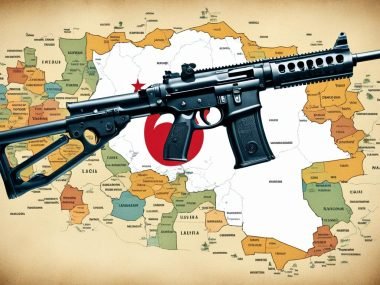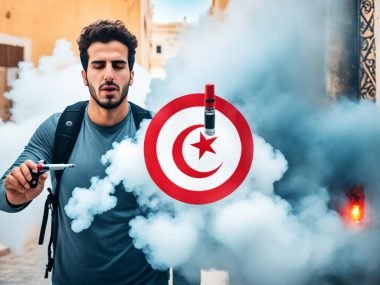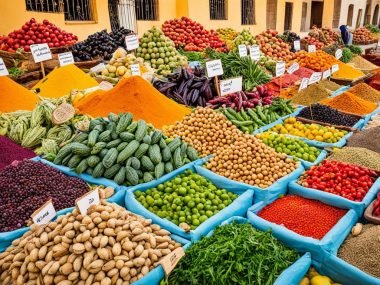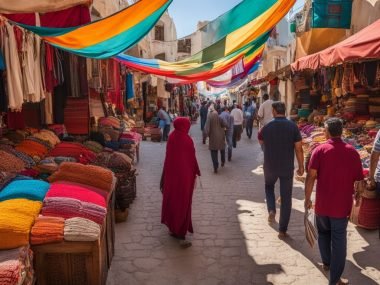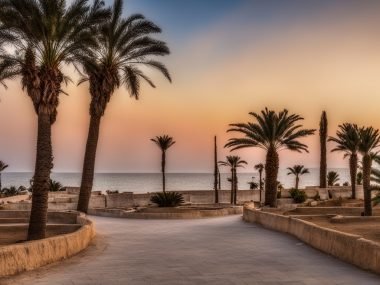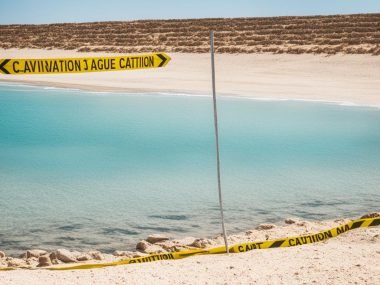In 2022, Tunisia saw over 9 million visitors. It’s a place full of history and stunning sights. But, U.S. travellers should be cautious. The U.S. State Department warns them. Specifically, about terrorism dangers near the borders with Algeria and Libya, and in mountain areas.
Using public transport in Tunisia may not be completely safe. Getting help in far places can be hard. It’s wise to have good medical insurance. This should cover getting you to safety if sick. Also, know the rules about money coming in and out to avoid big fines.
Signing up for the Smart Traveler Enrollment Program (STEP) is a smart move. It gives you the latest updates and helps in emergencies. Being ready and knowing what to expect makes visiting this North African jewel better and safer.
Key Takeaways
- Exercise increased caution due to terrorism risks, especially near the Algerian and Libyan borders.
- Public transportation may present safety concerns; stay alert.
- Comprehensive medical insurance, including evacuation coverage, is essential.
- Understand and comply with legal restrictions on currency import/export to avoid severe penalties.
- Enrol in the Smart Traveler Enrollment Program (STEP) for real-time alerts and emergency assistance.
General Travel Safety in Tunisia
When in Tunisia, it’s key to always be aware of what’s around you. Keeping up with local news helps you know if it’s safe to go out. This lowers risks linked to terrorism.
Overview of Travel Safety
The safety scene in Tunisia calls for care and watchfulness. It’s wise to stay away from any protests as they might turn violent without warning. When it’s dark, try to be in big cities or popular tourist spots to stay safe.
Getting full medical insurance is also vital for safety in Tunisia. This is important because of the terrorism threat. It means help is there if you get sick or need to be moved fast. Also, remember to follow the rules about money to avoid big fines.
Recommended Precautions for American Tourists
American visitors should take extra steps for their safety in Tunisia. Some good practices for staying safe are:
- Avoiding places with known protests to dodge possible trouble.
- Keeping to main cities and tourist places, especially after sunset.
- Ensuring you have full medical insurance that covers emergencies.
- Keeping up-to-date with local news on safety issues.
- Remembering to declare any Tunisian money when you arrive or leave.
The clear presence of Tunisian security forces, because of an ongoing emergency, shows the effort to fight terrorism. Tourists should be comforted by this. Yet, always be alert and mindful of your environment.
Crime Rates in Tunisia
When we talk about safety for tourists, Tunisia’s crime rates are important. Most visits to Tunisia are trouble-free. But, theft cannot be overlooked. Theft and scams have happened. It’s important to be careful.
For better safety for tourists, keep expensive items out of sight. Not showing off valuables reduces theft risks. Only carry what’s needed for your safety.
In summer, sexual harassment and assault cases go up. This especially happens in crowded or isolated places. It’s very important to stay alert. Keep to groups and avoid dark, empty places at night to stay safe.
Here’s a table comparing different safety tips for tourists:
| Concern | Recommendations |
|---|---|
| Theft in Tunisia | Avoid showing off expensive stuff, just take what you really need. |
| Sexual Harassment | Stick with friends, steer clear of crowded or lonely places at night. |
| Confidence Tricks | Be on your guard, watch out for too friendly strangers or weird offers. |
Knowing about crime and taking steps to stay safe is key in Tunisia. Always be ready for anything on your trip. This helps keep tourists safe.
Political Stability in Tunisia
Tunisia has seen a lot of ups and downs politically. There have been many protests in recent years. It’s very important for travellers to keep up with news. And to steer clear of places where protests might happen.
Current Political Climate
Politics in Tunisia can get heated. You might encounter political rallies and strikes suddenly. These can sometimes lead to tension. The government might set curfews or check points for safety. If this happens, it’s important to follow their advice.
Impact on Tourism
Political issues can affect visits to Tunisia. Travellers might think twice because of the uncertain political scene. Sometimes, protests happen at major tourist spots. This makes it riskier for tourists. Despite Tunisia’s attractive culture and history, this unrest can change travel plans.
Terrorist Threats in Tunisia
Terrorism is a big worry for anyone visiting Tunisia. In the past, the country has faced several terrorist incidents. These have mostly targeted security forces and foreigners. It’s good to know about these threats to stay safe while there.
Recent Terrorist Incidents
Many high-profile attacks have happened in Tunisia. Terrorist groups in Tunisia have attacked security and tourists. Due to these attacks, there are more security checks in cities and tourist spots now. It shows how important it is to be careful and know about potential dangers.
High-Risk Areas to Avoid
Some areas in Tunisia are very risky because of terrorism. Places near the Algerian and Libyan borders and the western mountains are dangerous. It’s best to avoid these spots based on travel guides. Doing this can make your trip much safer.
| High-Risk Zones | Description | Recommendation |
|---|---|---|
| Algerian Border | Area known for terrorist operations | Highly discourage travel |
| Libyan Border | High activity of terrorist groups | Highly discourage travel |
| West Mountains | Known for harbouring terrorist factions | Highly discourage travel |
Understanding the dangers in these high-risk zones is vital in Tunisia. Keeping away from these areas can make your visit much safer.
COVID-19 Precautions in Tunisia
Travelling to Tunisia means you must follow preventive health measures because of COVID-19. Knowing and following Tunisia entry requirements is key for a safe trip.
Check COVID-19 travel advice from places like the CDC before you leave. This advice gives important information on health steps. It tells travellers about needed vaccines and quarantine rules.
When you get to Tunisia, you must follow what the health experts there say. You will need to show a recent negative PCR test. And sometimes, you might have to take more tests when you arrive. These rules help keep everyone safe.
- Make sure your travel insurance covers COVID-19 situations.
- Follow local rules about wearing masks and staying apart from others.
- Keep up with the latest health news and travel warnings.
While you’re in Tunisia, always do what the local rules say. This might mean having to stay in at night, not going to big gatherings, and following other health steps.
| Requirement | Details |
|---|---|
| Negative PCR Test | Required within 72 hours before travel |
| Health Insurance | Comprehensive coverage including COVID-19 |
| Compliance with Local Health Protocols | Masks, social distancing, curfews, etc. |
Stay up to date with COVID-19 travel advice and follow Tunisia entry requirements closely. This helps lower risks and makes your visit to Tunisia safer during the pandemic.
Regional Risks and Advisory Levels
It’s very important to know about the safety of traveling to Tunisia. This includes knowing the dangers in some areas. Travellers need to follow the safety tips closely.

Border with Algeria
The area near the Algeria-Tunisia border is not safe. The U.S. says do not travel to places within 16 km of this border. This is because of terrorist dangers. Travellers should stay away from these areas.
Border with Libya
The Libya border area is also dangerous, just like near Algeria. Advice is to avoid places within 16 km of the Libya border. The risk of danger is high, so staying clear is best.
Western Mountains and Desert Regions
The western mountains and desert south of Remada have lots of risks. The U.S. and UK say these places are very dangerous because of terrorists. It’s best to avoid these areas to stay safe.
To better understand the risks, please see the table below. It shows the areas and their safety advice:
| Region | Advisory Level | Reason |
|---|---|---|
| Algerian Border | Level 4 – Do Not Travel | Terrorist Activities |
| Libyan Border | Level 4 – Do Not Travel | Terrorist Activities |
| Western Mountains | Level 4 – Do Not Travel | Military Zone |
| Desert South of Remada | Level 4 – Do Not Travel | Military & Terrorism |
Emergency Services in Tunisia
Going to a new country can sometimes lead to unexpected situations. It’s key to know how to get help quickly in Tunisia. Always have these important Tunisia emergency contacts with you:
- Ambulance: 190
- Fire: 198
- Police: 197
The US Embassy in Tunisia also offers crucial support for American visitors. They can help with a lost passport, emergency money, and advice in tough times. Here are the main details for the US Embassy in Tunis:
| Service | Contact Information |
|---|---|
| Telephone | +216 71 107 000 |
| TunisACS@state.gov | |
| Emergency After-Hours Contact | +216 71 107 000 |
| Website | tn.usembassy.gov |
Being able to get help fast is very important, especially in places you don’t know well. Make sure these contacts are easy to get to at all times. If you’re in trouble, quickly call the local emergency teams or the US Embassy in Tunisia.
Tips for Staying Safe in Tunisia
When travelling in Tunisia, make safety your top priority. This includes using public transport and staying healthy. Avoid trouble during demonstrations too.
Public Transportation Safety
Be careful when using public transport in Tunisia. Choose services that are well-known and reliable. Don’t go alone late at night.
Keep your things close. Watch out for pickpockets.
Staying Safe During Demonstrations
If you see a protest, stay away. Follow curfew rules if local leaders set them. Keep up with the news.
Knowing about demonstrations ahead of time helps avoid trouble.
Health Recommendations
Stay healthy in Tunisia by following local health advice. Check the World Health Organization for tips. Only drink bottled water.
When swimming, mind the safety rules to stay healthy. This keeps you safe from water illnesses.
To have a great trip to Tunisia, just follow these safety tips.
Legal and Cultural Considerations
Going to Tunisia means you need to know local laws and culture. This helps you visit respectfully and legally. Knowing about Tunisia’s laws on ID, dress, and behaviour is very important.

Local Laws and Regulations
You must always have your ID ready for security officials. Alcohol rules are strict, especially during Ramadan and Fridays. Actions between people of the same sex are not allowed, so LGBTQIA+ visitors need to be careful. Also, don’t take photos of government and military places, and remember, drug laws are very strict.
Cultural Sensitivity and Dress Code
It’s important to understand Tunisia’s culture. Outfits should be more conservative outside of resorts. Women should wear modest clothes, especially when visiting religious sites or villages.
During Ramadan, it’s good to respect local customs. Avoid eating, drinking, or smoking in public in the daytime. This respect makes your trip better.
Being respectful of Tunisian traditions and ways really improves your visit. It makes it more meaningful.
Safe Tourist Destinations in Tunisia
Tunisia is known for its rich culture and history. It has many places interesting to tourists. It’s important to stay safe while exploring.
Recommended Attractions
Start your journey in Tunis, the lively capital. It mixes modern life with historical sites. The Bardo Museum, famous for its beautiful mosaics, is a must-see. Another gem is Carthage. It lets you peek into the past with its amazing ruins.
Visit Sidi Bou Said for stunning views over the Mediterranean. This town is both lovely and peaceful. Don’t miss the El Jem amphitheatre. It’s a UNESCO site and one of the biggest Roman amphitheaters.
Accommodation Safety Tips
Choosing where to stay is key to a safe trip. Pick places known for being secure. Ensure your stay has security staff, cameras, and safe entry points. Using trusted sources and reading reviews helps find the best spots.
Always keep up with travel advisories. Stay alert, even in places that seem safe. Taking local advice and staying informed makes your visit better and safer.
Conclusion
Tunisia is a place with lots to offer. It has a rich culture and a deep history. But, it’s important to be safe while exploring. One must know how to travel wisely in this region.
American tourists should learn the local laws and stay away from places that are not safe. They also need to keep healthy. Getting ready for a trip means checking the U.S. Department of State’s advice. Also, signing up for the Smart Traveler Enrollment Program (STEP) is smart.
Being a responsible tourist means looking after yourself and respecting the local ways. It helps the local area too. If you plan well and stay informed, your trip can be both safe and rewarding. Learning and preparing are your tools for a great journey in Tunisia.


